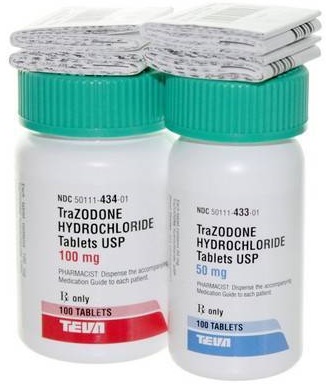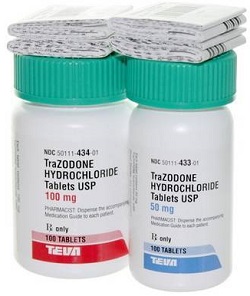Providing Quality & Trust || Clinic Website
Detailed Description
Trazodone
(traz-oh-done)
- Description: Serotonin 2A Antagonist/Reuptake Inhibitor; Anti-Anxiety Agent
- Other Names for this Medication: Desyrel®
- Common Dosage Forms: Veterinary: None.
Key Information:
- Used in dogs for anxiety-related conditions, including thunderstorm or fireworks phobias and activity restrictions (cage rest) after surgery.
- This medicine is commonly used in combination with other drugs to reduce anxiety.
- Trazodone may be given with food or on an empty stomach.
- If your animal vomits or acts sick after getting it on an empty stomach, try giving with food or a small treat and see if this helps.
- If vomiting continues, contact your veterinarian.
- May take up to 2 weeks to achieve its calming effect, especially when used alone.
- Most common side effects are sleepiness and decreased activity.
- Use with caution in working/service dogs as they may be unable to perform their duties while on this medication.
For this medication to work, give it exactly as your veterinarian has prescribed. It’s a good idea to always check the prescription label to be sure you are giving the drug correctly.
How is this medication useful?
Trazodone can be helpful in dogs to help treat a variety of anxiety-related conditions, such as thunderstorm or fireworks phobias and activity restrictions (cage rest) after surgery. Trazodone is often used as an additional medication for behavioral problems that do not adequately respond to just one medication.
- The FDA (U.S. Food & Drug Administration) has approved this drug for use in humans, but itis not officially approved for use in animals.
- The FDA allows veterinarians to prescribe and use human products containing this drug in animals in certain situations. You and your veterinarian can discuss why this drug is the most appropriate choice.
How should this medication be given?
For this medication to work, give it exactly as your veterinarian has prescribed. It’s a good idea to always check the prescription label to be sure you are giving the drug correctly.
- May be given with or withoutfood. If your animal vomits or acts sick after receiving the drug on an empty stomach, try giving the next dose with food or a small treat. If vomiting continues, contact your veterinarian.
- Compounded liquid forms of this medication must be measured carefully. Your veterinarian or pharmacist can help by providing special measuring spoons or syringes.
- If you have difficulty getting your animal to take the medicine, contact your veterinarian or pharmacistfor tips to help dosing and reducing the stress of medication time.
- This medication can be given for various lengths of time. Be sure you understand how long your veterinarian wants you to continue giving this medication. Prescription refills may be necessary before the therapy will be complete. Before stopping this medication, talk to your veterinarian, as there may be importantreasons to continue its use.
Uses/Indications:
Trazodone may be useful in treating behavior disorders in small animals, particularly when used as an adjunctive treatment in patients that do not adequately respond to conventional therapies. Trazodone appears to be effective in providing short-term relief of anxiety during hospitalization and postoperative confinement after orthopedic surgery. However, a placebo-controlled study found no difference between postoperative dogs given trazodone and those given a placebo to facilitate calmness and ease of confinement.
A recent study showed that when trazodone was administered before induction of general anesthesia in healthy dogs undergoing orthopedic surgery, the hemodynamic and propofol-sparing effects of trazodone were comparable to those of acepromazine. Use of trazodone premedication also demonstrated an isoflurane minimum alveolar concentration (MAC)-sparing effect in dogs.
Trazodone has been used anecdotally to decrease the hyperesthetic effects associated with strychnine toxicity.
Pilot studies in cats suggest trazodone is an effective sedative or anxiolytic and may improve tractability during veterinary examinations. Systolic blood pressure was significantly decreased in healthy cats undergoing an echocardiogram, without altered echocardiographic results.
Trazodone use in horses undergoing stall rest and exhibiting adverse behaviors resulted in significant calming in 17 out of 18 patients.
In humans, trazodone is used for treating depression, aggressive behavior, alcohol or cocaine withdrawal, panic disorder, migraines, and insomnia.
What are the side effects ofthis medication?
Common but not serious, side effects include:
- Sleepiness, lack of energy, loss of coordination, diarrhea, vomiting, or gagging.
- Agitation (anxious, nervous, upset, unable to relax), aggression (threatening behavior or actions), or other behavior changes.
You don’t have to be overly concerned if you see any of these signs unless they are severe, worsen, or continue to be a problem. Contact your veterinarian if this happens.
Side effects that may be serious orindicate a serious problem:
- Irregular heartbeat, severe aggression (threatening behavior or actions), loss of consciousness (passing out).
If you see any of these signs, contact your veterinarian immediately.
Precautions/Warnings:
Trazodone is contraindicated in patients hypersensitive to it or in those receiving, or that have recently used, monoamine oxidase inhibitors (MAOI; including amitraz and, possibly, selegiline). Trazodone should be used with caution in patients with severe cardiac disease or hepatic or renal impairment. Trazodone may dilate the pupils, which could trigger an acute crisis in patients with angle-closure glaucoma.
Care must be taken not to confuse traZODone with traMADol.
If you have any other questions about this medication, contact your veterinarian or pharmacist.
Powered by nopCommerce
This site is running in live payment mode. Real payments will be processed.

